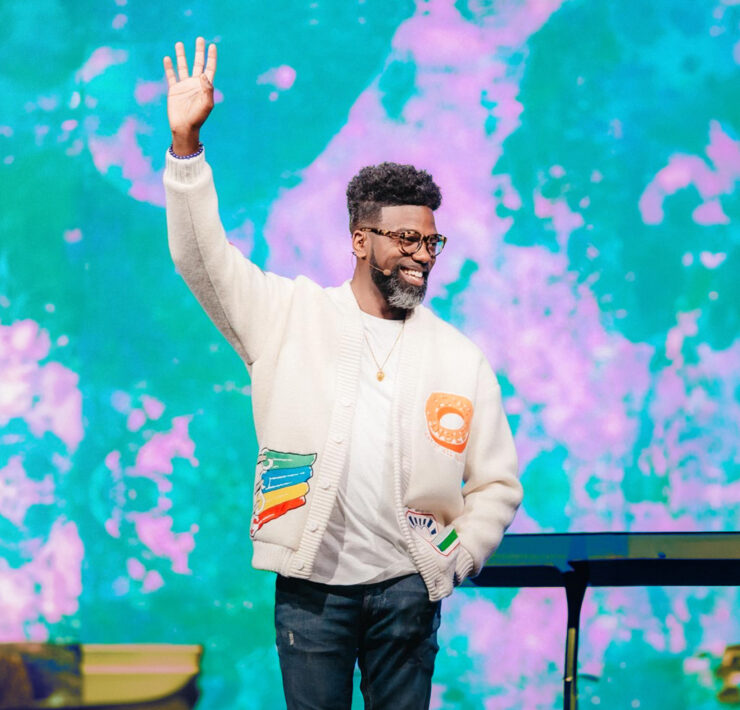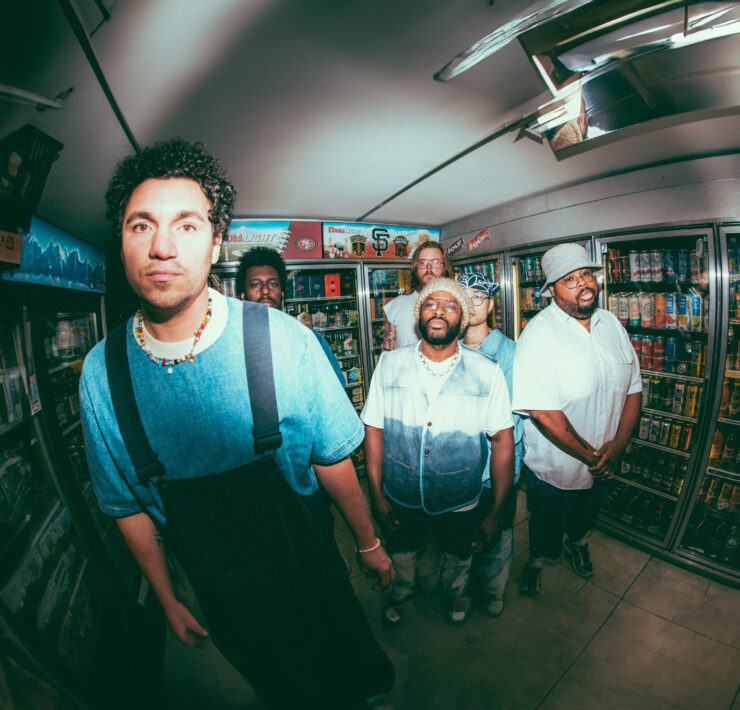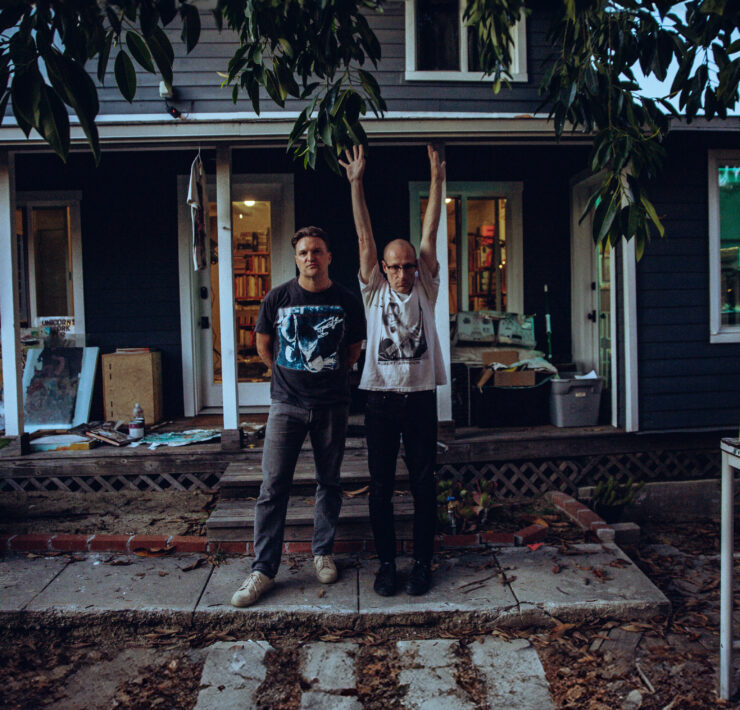
 EXCLUSIVE
EXCLUSIVE
Already a member? log in
NO COMMITMENT REQUIRED, CANCEL ANYTIME.
In light of news that Gaffigan will be starring in a new movie about Jesus People, we thought we’d reshare our interview with the famous comedian and his wife’s story of a time in their life that wasn’t funny at all — and how they found humor and hope in the middle of it.
If you’ve ever heard the stand-up comedy of Jim Gaffigan—which, if you have Netflix or even an internet connection, you probably have—then you’ve also heard the comedy of Jeannie Gaffigan. Even before they were married back in 2003, the two wrote together and have since taken over the world of stand-up. From their humble beginnings writing sketch comedy and material for Jim’s club gigs, the duo built a brand of clean, relatable jokes enjoyed by everyone from comedy snobs to their impressionable kids.
For years, Forbes has consistently listed Gaffigan among the world’s highest-earning comics, raking in tens of millions of dollars thanks to sold-out tours, streaming specials and (now) feature films.
And while it’s Jim who is on stage delivering his self-deprecating one-liners about junk food (Hotttt Pockettts), gym avoidance and the challenges of raising five kids, it’s been Jeannie behind the scenes helping craft material, produce shows and keep the pipeline of punchlines flowing to meet the ever-increasing demand for Gaffigan humor. It’s been a remarkable rise to the top for the powerhouse couple.
Then, 2017 happened. Tragedy struck, and everything changed.
“I lived in this very likely reality that I was going to be a single father of five children,” Jim says, looking back.
More Than They Can Handle
In the spring of 2017, Jeannie went to see a doctor after months of headaches and flu-like symptoms. As a busy mother, writer and producer, she assumed it was related to stress. But after an MRI, doctors told her she had developed a brain tumor the size of pear.
Needless to say, the prognosis was not good.
Jeannie is a devout Catholic—you might gather as much from the Bible jokes in Jim’s sets—but in the days following the diagnosis, the prospects of a risky brain surgery and likely complications overwhelmed the couple.
“It was just too much information for me to turn immediately to God,” Jeannie remembers. “But at a certain point, pretty quickly, when everything was kind of swirling around, it became clear to me that I was not going to be able to handle this.”
Jeannie says she thought of the old adage about how “God doesn’t give you anything you can’t handle,” and then she decided to pray.
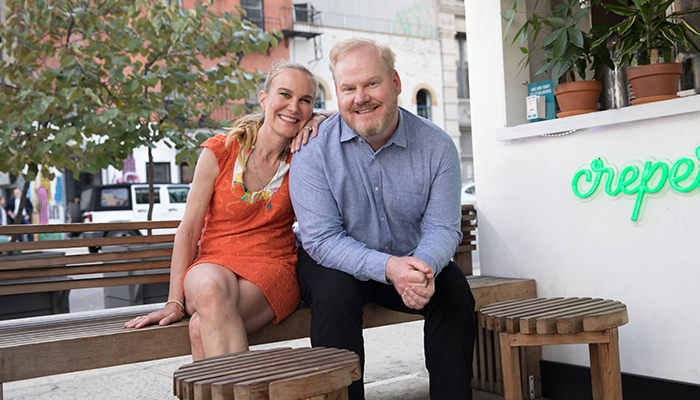
“I just said, ‘Listen God, if you don’t give people things they can’t handle, I’m just going to say I can’t handle this, so please handle this,’” she says.
“I had this very frank conversation with God saying, ‘I’m just going to turn over this situation to You, and I’ll work as hard as I can in whatever way You can guide me, but there’s no one else I can turn to in this situation.’”
Jim is a Christian as well, but it was Jeannie’s posture that he leaned on in the early days of the diagnosis. Faced with the prospect of losing his writing partner, the mother of his children and the love of his life, Jim turned to faith as well.
“There’s almost a calmness that overcame me,” Jim says, looking back. “There was something about Jeannie’s deep faith, and the comfort and the peace that she encountered, coupled with her overall bravery, that reassured me.”
Just like he’d done throughout his career—and throughout his marriage—he leaned on her faith when his own wouldn’t carry him alone. In fact, Jim says his wife is the one who taught him how to have faith.
“You know, I lived across from a Catholic church for fifteen years,” he says, referencing the time before he and Jeannie got married in New York. “[I] never went in it, and then got married in it and now all my children were baptized and confirmed in it. So I kind of followed the leader that I’m with, you know what I mean?”
Following the Leader
Jim remembers during one of the health screenings, Jeannie went in for an MRI. For this particular MRI, the results were literally life or death.
“She was still on the gurney, and she looked at me and she said, ‘Write this down. These are observations on the MRI,’” Jim says. She was ready to start working on material.
Even in one of the darkest moments of their lives, Jeannie dealt with it like she’d dealt with everything—she wrote jokes about it.
“One of the things that got us through is that fact that we’re used to viewing our lives through the lens of comedy,” she says. Jeannie says that her husband’s comedy has always been observational, and without knowing it, the couple was coaching themselves on how to find the humor in things that don’t necessarily seem funny at first blush, the things that “we may not think of as funny, such as a bottle of body wash or a Hot Pocket, or whatever.” Or, in this case, cancer.
Soon, the battle with the aftermath of Jeannie’s brain tumor made its way into their stand-up routine. But even off stage, Jim, Jeannie and their friends found jokes in an experience that probably doesn’t seem all that funny to the outside observer.
“Jeannie had a friend come and visit and the first thing the friend said was ‘Oh, you’re not even bald,’” Jim remembers. “The thing about humor is that it’s unifying in that it might be gallows humor, but it’s also an opportunity to alleviate the tension.”
Jeannie’s tumor was a very rare type of brain lesion called a papillomaof the choroid plexus. And though doctors were miraculously able to remove it, she faced months of setbacks: surgeries, being bedridden for weeks at a time, eating through a feeding tube, a near-fatal bout of pneumonia and losing her ability to speak for three straight weeks. The fact that the couple is able to joke about this doesn’t mean that any of it was easy.
However, Jim and Jeannie are on the other side now. And though their lives have returned to normal, in many ways, nothing is how it used to be. And they wouldn’t have it any other way.
A New Life
“I’m grateful for having this brain tumor happen to me,” Jeannie now says.
“There was something about Jeannie’s deep faith and the comfort and the peace that she encountered … that reassured me.” —Jim Gaffigan
Considering all of the setbacks, physical pain and emotional devastation caused by her tumor, that may seem like an odd statement. But since Jeannie’s tumor, the Gaffigans have a new way of seeing the world.
“I think now my faith is much more centered in gratitude than it is about asking for things,” Jeannie says. “So even though I wouldn’t have defined my faith before as asking for things, ironically me turning to God when I needed Him the most and asking Him to help me through it, I kind of felt my faith, through that whole process, blossomed into this gratitude.”
The tumor made Jeannie realize just how much she truly had to thank God for.
“I was kind of losing touch in my life, even though looking back at my life prior, the things that were happening in my life were so amazing, whether it was career-wise or my kids or my extended family, but it took me going through this crisis to experience true gratitude,” she says.
Even Jim, a comedian who’s made a career out of being grumpy about everything from physical exercise to the composition of fast food, has found a new outlook.
“You can’t go through that experience without being in touch with some gratitude,” he says. “And particularly, being in touch with the notion of how little control we have and how humble this existence is.”
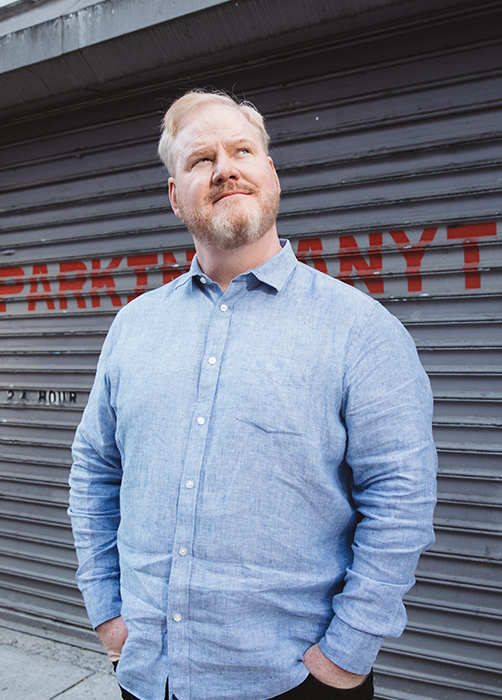
Fans don’t need to worry too much though. Jim Gaffigan is still the same old funny, melanin-challenged grump you know and love. This has not changed him in a terribly fundamental sense.
“I would say that three months after it, I was still angry about a cab driver taking the wrong turn,” he says.
But while the situation didn’t change the couple’s outlook on life; it did lead to a change in Jim’s approach to his career.
In the midst of Jeannie’s treatment, Jim considered retirement from comedy. But when he decided to start working again, something happened. Suddenly, producers were eager to offer him dramatic roles.
“I waited 30 years to get seven movies that they decided to give me all in one year,” he says. “But it’s one of these things where you don’t have control over the timing, and you don’t have control over when opportunities come.”
This summer, Jim starred in the indie-thriller Them That Follow, about the children of a family of serpent-handling, Pentecostal churchgoers in a remote part of West Virginia that begin to question their faith.
“One of the things that I was impressed with in the script is that the script wasn’t a judgment on these people. It wasn’t like ‘These idiots!’” he says.
In fact, it was the faith element that drew him to the story.
“Being someone of faith …it didn’t feel that foreign; it didn’t feel that insane. People might think that’s really silly on the surface, but these people, this is what their faith, this is what their peace is grounded in.”
“That’s the ultimate faith … That I was able to just say I knew that God was going to work this out in His will.” —Jeannie Gaffigan
In American Dreamer, which hits theaters this fall, he plays a down-and-out father who goes from being a ride-share driver to hatching a kidnapping-and-ransom plot in order to get money and not lose contact with his own son.
“I think that in both Them That Follow and American Dreamer, there was something really appealing about playing someone flawed, who has flawed reasoning, but something where I could empathize or understand,” he says.
For Jim and Jeannie, the move to more dramatic roles is a risk, especially for a generation of fans used to their brand of clean, goofy jokes. But this isn’t the same couple who wrote the Hot Pocket bit. A tumor the size of a pear changed everything for the Gaffigans. They’re ready to make their new outlook public.
Jeannie’s first book, When Life Gives You Pears: The Healing Power of Family, Faith and Funny People, comes out this fall. In it, she talks about what it means to truly trust God even when you don’t know what the outcome will be.
“I think in retrospect, it made me realize that that’s the ultimate faith,” Jeannie says. “That I was able to just say I knew that God was going to work this out in His will, whatever way it was, but I couldn’t control the outcome.”
















